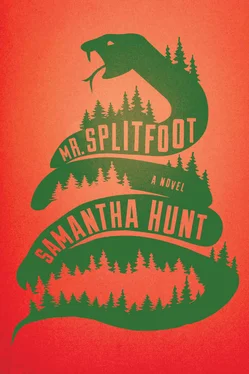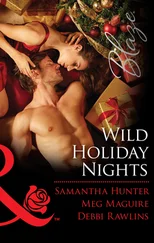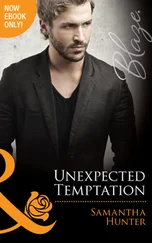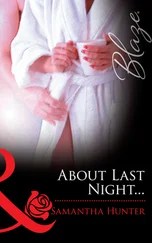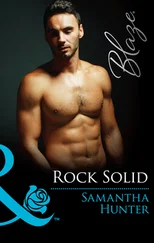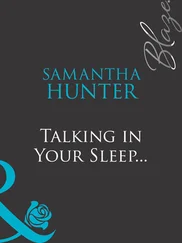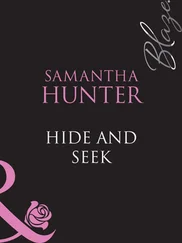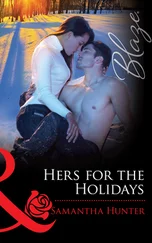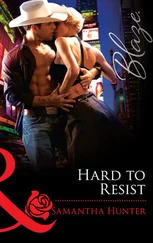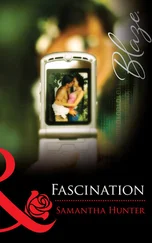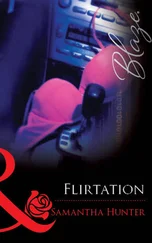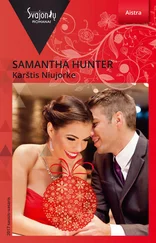“I don’t know, Father Arthur. I don’t know what you want me to say.”
“Correct.” He blooms into a smile. “Tomorrow,” he announces, “Muslims!”
Ruth takes a seat, and the Father begins the day’s lesson on the chalkboard, geometric proofs detailing how the three branches of American government — executive, legislative, and judicial — are a false trinity. The lesson is long. The Father includes stops along the way at the Declaration of Independence, the Emancipation Proclamation (big smiles to Colly) and Roe v. Wade. The Father knows the story of history and manages to actually educate the children by teaching them to think and ask questions, to not accept the rubbish they hear, especially his rubbish.
Every day the lesson winds up at the Apocalypse. Total financial collapse, hurricane, earthquake, or nuclear war — it makes no difference to him. The Father used to prepare to survive the Apocalypse, spending the State’s money on rations and rifles. He taught the children skills to live through the devastation: farming, engineering, dowsing, husbandry, canning, intermediate nursing, and marksmanship to destroy the hungry hordes moving north from the city. Then one morning, coming off a binge, John 2:15 came to him. “If any man love the world, the love of the Father is not in him.” At breakfast he told the children, “I don’t want us to survive.” He looked around the room. “What was I thinking, children? Trying to forestall the time when we will dwell with Heavenly Father in paradise? I must have been nuts.” Which, of course, he was.
When the Father’s done, he asks, “Ruth? You ready?” Once a week, as a senior student in his school, she’s allowed to teach the other children about birds.
Ruth straightens her dress. “Thank you.” In a quiet voice she tells the others, “This week, you might be interested in the Red-Eyed Vireo.” She flips through her Peterson Field Guide, a present from the Father last Christmas, her only present and a generous one, as most books are not allowed at Love of Christ! “These birds build cup-shaped nests in the forks of trees and fall victim to brood parasitism at the hands of the cowbird. Does anyone know what that means?”
No volunteers.
“That’s when cowbirds slip their eggs into the vireo’s nest so they won’t have to raise their own babies.” Ruth moves through mating habits, habitat, diet, and migration patterns. “The good news is vireos spend their winters in South America.”
After class, more chores. The Father retires to his private quarters, bolting his door. Rumors say he’s got his liquor, an Internet connection, and the only phone in the house in there.
Outside the barn there’s a plastic playhouse partially melted by vandals with a roofing torch. The Father keeps it around as a metaphor. Ruth thinks of her melted face, her endangered soul.
Nat and Ruth wash clothes in the laundry room. She handles undershirts; he pairs the piles of socks. Alone with Nat, a perfect place can exist, their own terrarium. “Nat.” She lifts a clean shirt. He smiles. Her nose detects the alkylbenzene sulfonate surfactant in the laundry soap. She twitches. A sneeze mounts in her lower meatus. She swallows it.
They carry the damp bedclothes out to the drying line, the light of the long afternoon sun. In the yard behind the house, they hang blankets and sheets to dry. Nat makes a hidden place for them in the linens, away from the other kids. Ruth sweeps some dried leaves into a nest. He grabs her arm. “Pretend you’re my wife. Lie underneath me.”
She lies down. He takes his place on top of her. Two flat, straight, clothed bodies. Nat pins her to the earth, and Ruth doesn’t flinch, doesn’t even brush a hard stem or stick from her neck. They feel one another through their clothes, all the systems of their bodies — circulatory, respiratory, others whose names they can’t remember just then. They don’t kiss or grope. They’re sisters. Some time passes, some birds overhead. Nat stands, dust his knees, and returns to hanging laundry.
“Wait,” Ruth says. “Pretend I’m your wife still, but pretend I cheated on you with your boss. You have to punish me.”
“All right.”
Nat lashes her to the clothing line with imagined ropes. He lifts her dress over her head. He beats her bare back with a real stripped branch, gently at first. “Jezebel. Judas.” When he strikes, rainbows are released from her skin. Three, four, five. She feels it. He lets in the air. Nine, ten lashes until finally she says, “That’s good. Thanks.”
Six damp sheets make a house. The afternoon sun warms the small room. If this were a Father-approved Christian teen movie, Chastity and Adam or In the Sheaves, this would be the moment where the young sweethearts feel God’s love burning into them and the righteousness of their lives, imagining their wedding day. But Nat and Ruth — having just finished a tidy whipping — are not a Christian movie. “Sinners,” he says.
“Jesus doesn’t mind. He’s like us. He is us.”
“You’re Jesus?”
“Sure. And you. Your mom. Telephone poles, flowers.”
“Fried chicken?”
“Sure.”
They return to the house more twisted into one another than they’d been the day before.
After chores, the Mother, and thus dinner, cannot be found. This is not unusual.
The Father doles out three dollars and sixty-five cents per child. They pile into the pickup. He drives to town. The Father says, “Heavenly Deity, we are grateful for these gifts we are about to receive.” The Father waits while the children get supper at Hook’s Diner. Hamburgers cost two twenty-five. The waitresses scowl at the non-tipping orphans. The other diners stare at the children’s clothing, wondering if they are involved with a historical reenactment museum.
Nat and Ruth pool their funds for an open-faced roast turkey sandwich with gravy. Roberta eats a slice of apple pie, pocketing the rest of her cash so she’s got some savings. It’s risky. Things get stolen in the home. Underwear, food, toothbrushes, money, of course, photos of strangers. Many of these stolen items end up in Nat’s dresser drawers.
The Father storms through room check. “I will plow your fallow ground! I will plant the seeds of understanding! I will cut off the ugly head of self-centeredness in you like a venomous viper in a baby’s crib. Draw into a quiet shell and obey!” Spit flies. The Father crushes his fists together, wondering what Trojan den of iniquity his wife disappeared into today. He imagines her dancing on tabletops. He falls down to his knees and back up again, amazing feats of strength powered by jealousy. “Now let me hear you sing praises to God!” which confuses a number of the children. Draw into a quiet shell or sing? The Father passes out state-mandated anti-psychotics to some, Adderall to most. The Father starts a hymn. “And if the devil doesn’t like it, he can sit on a tack!” He claps his hands while Ruth, Nat, and the other children join in. A blessed day at Love of Christ! comes to an end.

INDEMNITY IS A SUM PAIDfrom A to B by way of compensation for a particular loss suffered by B. From eight-thirty until nine in the morning, I skim through claims. Three house fires. Seven no-fault car accidents. A flood. One act of vandalism. Who is responsible? That depends. I gulp cooling coffee. I don’t handle business claims or life insurance. I make phone calls. After lunch I have an inspection in the field. I check the battery on my camera. By nine-thirty I need a break. I fire up my computer and run a search on Lord’s wife, Janine. Nothing new. No obituary or anything. A couple of old records she broke in high school track and a picture from when she worked in real estate. Two eyes, a nose, and a mouth. Hair on her head. There’s nothing special about Lord’s wife.
Читать дальше
